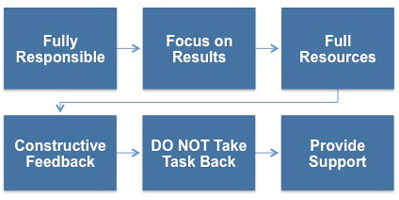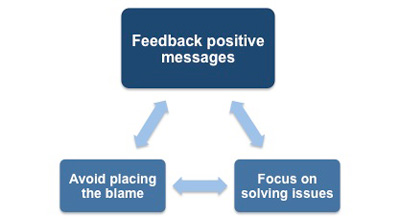Delegation in Management
Whilst the stages you work through to decide whether or not it is appropriate to delegate a task, and to whom, are important, they are not the only aspects of success you must observe. There are certain competencies and behaviors you must adopt to ensure your success when delegating in management.
 |
Give Full Responsibility
It is a serious error to delegate a task without giving the chosen person sufficient responsibility. This situation becomes a major obstacle for the individual and a drain on their time and productivity, as they permanently have to seek your approval of the actions they wish to take. This results in poor performance and could become a major aspect of why the task failed.
Focus on the results, not on the process
As the manager delegating a task, it is vital that your role focuses on the required result and not on how the task should be performed. At the outset, you must clearly state the required outcomes and explain what must be achieved and what the measurements will be, and clarify how you intend to decide that the job was successfully done. This includes the specific outcome that is required and the standard that is expected.
Team members need to decide how to make use of the authority that has been delegated to them and should be allowed to work in a way that suits their own individuality and method of working. Your role should be to offer coaching and mentoring to the person if and when they require it. The extent to which you need to perform this role will become self evident through the regular reviews you set up.
Provide the necessary resources
In order to complete a task or project, you may need to involve other departments within the organization. If this is the case then always provide full information about all of the people within the organization that can collaborate.
The successful outcome of any task or project is heavily dependent on whether appropriate and sufficient resources are available as required. As the manager, it is your responsibility to ensure that adequate resources are available.
Give constructive, and positive, feedback
A vital aspect of any task or project is the regular communication on how well the delegated person is performing. For this type of dialogue to be pertinent, it must be timely and constructive in how it is fed back.
 |
The use of positive messages within your feedback will gain you respect and cooperation. This is especially effective when things are not going as expected. By focusing on how best to solve the problems that have emerged, rather than looking to place the blame, you are more likely to succeed in your goal or to achieve the most positive outcome possible.
When a team member feels they have your complete support, they will expend even more effort in ensuring a successful outcome.
Do not allow them to delegate the job back to you
When a team member encounters problems they will usually refer back to you. It is difficult to resist the temptation to take control when this happens. Your best course of action is to suggest two or more possible solutions and leave it to them to choose which to implement.
If you attempt to take back control at this point, you are in a no-win situation. If you succeed, then completing the task will be your responsibility, and if you fail, then the team member will no longer trust you and will be unlikely to make you aware of any future problems in a timely way.
Provide backup and support when needed
Situations often occur during a task or project where your support is required to eradicate issues or problems. From the outset, you need to have clearly defined what resources you will call upon and how much of your own personal time you will commit if needed.
 |
You should actively schedule your own involvement from the beginning, as this will ensure that you stay on top of progress and will be available if the project requires your input in order to get back on track - for example, by making a phone call to someone who is involved in the project but not fully cooperating. It is important that team members know that they have your full support. This Successful Delegation Checklist outlines the correct process you should follow when delegating a task.
You may also be interested in:
Delegation of Authority | Principles of Delegation | The Six Stages of Delegation | Monitoring Delegated Tasks | Advantages and Disadvantages of Delegation.



